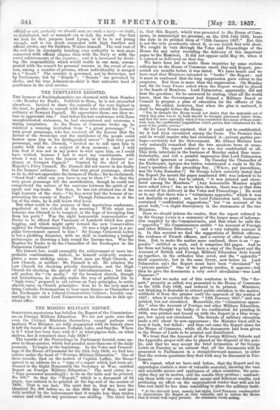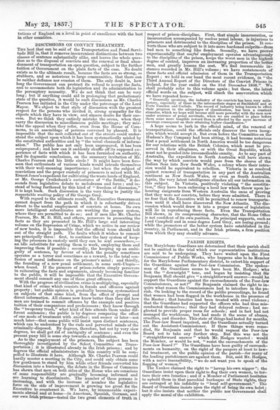THE MISSINGMILITARY REPORT.
SOMETHING mysterious has befallen the Report of the Commissioners on Foreign Military Education. We are not quite sure that even the Cabinet Ministers themselves, except perhaps our taciture War Minister, are fully acquainted with its history gime it left the hands of Messieurs Yolland, Lake, and Smythe. Where is it ? what has been done with it ? in what pigeon-hole, on what shelves, has it remained since July 1856?
The records of the Proceedings in Parliament furnish some answer to these queries, which had puzzled more than one of the daily journals. To begin at the beginning. In the Votes and Proceedings of the House of Commons for the 25th July 1856, we find two entries under the head of "Foreign Military Education." One of these records, that on the motion of Captain Laffan, the House agreed to an address for a "copy of a report which had been addressed to the Right Honourable the Secretary at War, entitled Report on Foreign Military Education." The next entry is" Copy presented accordingly; to lie on the table and be printed, No. 406." Sc that the "Report," which is a document of 84 pages, was ordered to be printed at the fag-end of the session of 1856. That is One fact. The next fact is, that we have the identical No. 406 before us, on this 20th day of May, and are duly notified by the indorsement that it weighs less than twelve ounces and will cost any purchaser one shilling. The third fact is, that this Report, which was presented to the House of Commons, in manuscript we presume on the 25th July 1856, bears the date in its printed form of "12th January 1857." But this is not the only peculiarity about it, as our fourth fact will show. We sought in vain through the Votes and Proceedings of the House for any entry recording the delivery of this important paper to the Members. It did not appear until May 20, when it in entered as delivered on that day.
We have been led to make these inquiries by some curious colloquies in the House of Commons anent this caul Report, presented six months before it was dated. We have heard and we have read that Ministers intended to " burke" the Report : and it must be confessed that its long suppression gave colour to the suspicion. But there is more than the suppression. On Monday last, Sir De Lacy Evans asked when the Report would be placed in the hands of Members. Lord Palmerston apparently, did not hear the question; for he answered by stating, what all the world knew, that the Government had formed a Military Board or Connell to prepare a plan of education for the officers of the Army. He added, however, that when the plan is matured, it shall be brought before the House.
"But he thought the Rouse would not desire that the materials out of which that plan was to be built should be brought piecemeal before them, and that the more especially when it was considered that many of those materials were the confidential suggestions which parties had volunteered for the good of the public service."
Sir De Lacy Evans rejoined, that it could not be confidential, for it had been circulated among the Peers. The Premier then said he would inquire who had circulated it—private parties perhaps—certainly not the Government. Mr. Sidney Herbert here very naturally remarked that the two speakers were at crosspurposes. The report referred to was not confidential at all. This little interlude in the business of Monday ended thus unsatisfactorily, and left a painful impression that Lord Palmerston was either ignorant or evasive. On Tuesday the Chancellor of the Exchequer, apropos des bottes, volunteered a reply to Sir De Lacy's question of the preceding day. [Where, par parenthese, was Sir John Ramsden ?] Sir George Lewis correctly stated that• the Report (he meant the paper numbered 406) was ordered to be printed in July, last; but he added, "it was printed and circulated among the Members." [Any. honourable Member might have asked when ? for, as we have shown, there was at that date no record of its delivery in the Votes and Proceedings.] He went on to say that there was a "voluminous appendix," which it was not desirable to print ; not, as Lord Palmerston said, because it contained "confidential suggestions," but "on account of its great bulk,"—a slight discrepancy in the statements of the two• Ministers.
Here we should inform the reader, that the report referred to by Sir George Lewis is a summary of the larger mass of information supplied by the Commissioners, and that what he calls the " appendix " the Commissioners entitle "An Account of Foreign and other Military Education " ; and a very valuable account it is. In this account we find the suggestions of British officers, the evidence of French officers, and a variety of other information. But, to make the matter more confused, there is an " appendix " entitled as such, and it comprises 245 pages. And so far from not being in print, we have a copy of the Report and the Account of British and Foreign Military Education duly bound up together, in the orthodox blue cover, and the "appendix" itself separately, but in the same livery, now before us. Lord Palmerston says the Report must have been "circulated" by "private parties." One of the private parties, it appears—but then he gave the documents a very select circulation—was Lord Panmure .
Now what we make out of this confusion is this. The "Report," properly so called, was presented to the House of Commons on the 25th July 1856, and ordered to be printed. Ministers, not thinking it desirable to attract public attention to the matter, withheld it from the printer until the approach of the session of 1857; when it received the date "12th January 1857," and was printed, but not circulated. Meanwhile, the voluminous appendix" alias the Account of Foreign and other Military Education, which was thought too bulky or too confidential for printing in 1856, was printed and bound up with the Report in a blue wrapper, but again not circulated. The friends of military education made a stir about its non-appearance ; the Minister tried still to keep it back, but failed; and then out came the Report alone for the House of Commons, while all the documents had been given to the House of Lords to be printed and distributed. We trust that the Account of the Foreign Military Schools and the Appendix proper will also be placed at the disposal of the public, and that we may accept the brief intimation of Sir George Lewis on Tuesday as an earnest that all the documents will be presented to Parliament in a straightforward manner, in order that the serious questions they deal with may be discussed in Parliament.
We repeat, what we have said before, that the Report and its appendages contain a store of valuable material, showing the vast and scientific means and appliances of other countries, the principles they set in motion, and the results they produce ; contrasting them with our own deficient means and deficient results, and producing an effect an the unprejudiced reader that will not let him rest until he has done something to place the military insti
• At the eleventh hour, namely last night, Lord Panmure condescended to characterise the Report as very valuable, and to inform the House that it would well repay perusal. An admission worth noting.
tutions of England on a level in point of excellence with the best in other countries.



























 Previous page
Previous page